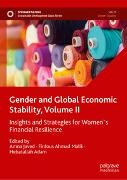Read more
As economies navigate challenges and opportunities in an increasingly globalized and interconnected world, the concept of financial resilience has gained prominence. Women play a crucial role in driving economic development yet often face unique challenges and barriers in accessing financial resources and opportunities.
This second volume focuses on climate resilience, global economic stability, gender-based challenges, and regional perspectives. Through a collection of chapters, it analyzes current trends, challenges, best practices, and innovative solutions for enhancing financial resilience and promoting women's economic empowerment globally, and will be of interest to both development finance and gender equality scholars, practitioners, and policymakers.
Amna Javed is a Senior Lecturer in the Graduate School of Knowledge Science, Japan Advanced Institute of Science and Technology (JAIST), Japan.
Firdous Ahmad Malik is an Assistant Professor of Economics at the University of People, Department of Management, USA.
Hebatallah Adam is an academician, editor, and scholar with more than 20 years of teaching and research experience in international economic development. She is a Professor of Economics and Academic Dean at the Jindal School of International Affairs (JSIA) as well as the Founder and Director of the Jindal Centre for the Global South – O.P. Jindal Global University, Haryana, India.
List of contents
Climate Change and Environmental Sustainability.- Chapter 1 Insights into the Issue of Environmental Sustainability in India.- Chapter 2 Green financing and Women’s Sustainable development.- Chapter 3 Green Financing and Its Role in Promoting Women Sustainable Development: Case Study of Europe.- Chapter 4 From Women Empowerment to Sustainable Development: The Transformative Role of Financial Inclusion.- Chapter 5 Analyzing Labour Force Participation and Export Obstacles for Females in Pakistan.- Chapter 6 Economic and Social Determinants of Women’s Financial Freedom.- Socio-Cultural and Institutional Barriers.- Chapter 7 The Socio-Economic Restraints to Financial Inclusion of Female-Owned SMEs in BRIC Economies: A Case Study Approach.- Chapter 8 Workplace Gender-Based Violence and its Economic Implications for Women in the Global Economy.- Chapter 9 Protecting Women in the Informal Economy: A Critical Analysis of India's Social Security Code 2020 and International Perspectives.- Chapter 10 Breaking the Glass Ceiling: The Socio-Economic Restraints to Financial Inclusion of Female-Owned SMEs in BRICS Economies.- Chapter 11 What Holds Women Back? Financial Inclusion, Barriers, and Demographic Disparities in the Global South.- Case Studies and Regional Perspectives.- Chapter 12 Social Media’s Role in Advancing Financial Inclusion Among Gen Z Investors.- Chapter 13 Block Chain-Driven Transformation in Banking: A Pathway to Sustainability Development.- Chapter 14 Microfinance as a Catalyst for Women's Empowerment: A Case Study of Lucknow, Uttar Pradesh, India.- Chapter 15 Breaking the Shackles and Moving Beyond Growth, Self-Reliance and Sustainability: A Case Study on Successful Women Led Businesses.- Chapter 16 A Statistical Study on the Estimation of Women Financial Inclusion and its Impacts on Economic Development: Evidence from India.- Chapter 17 Determining Environmental Sustainability through Positive Organizational Culture and Responsible Women Leadership.- Chapter 18 Exploring the Relationship Between Green Entrepreneurship and Sustainable Development.
About the author
Amna Javed is a Senior Lecturer in the Graduate School of Knowledge Science, Japan Advanced Institute of Science and Technology (JAIST), Japan.
Firdous Ahmad Malik is an Assistant Professor of Economics at the University of People, Department of Management, USA.
Hebatallah Adam is an academician, editor, and scholar with more than 20 years of teaching and research experience in international economic development. She is a Professor of Economics and Academic Dean at the Jindal School of International Affairs (JSIA) as well as the Founder and Director of the Jindal Centre for the Global South – O.P. Jindal Global University, Haryana, India.
Summary
As economies navigate challenges and opportunities in an increasingly globalized and interconnected world, the concept of financial resilience has gained prominence. Women play a crucial role in driving economic development yet often face unique challenges and barriers in accessing financial resources and opportunities.
This second volume focuses on climate resilience, global economic stability, gender-based challenges, and regional perspectives. Through a collection of chapters, it analyzes current trends, challenges, best practices, and innovative solutions for enhancing financial resilience and promoting women's economic empowerment globally, and will be of interest to both development finance and gender equality scholars, practitioners, and policymakers.

